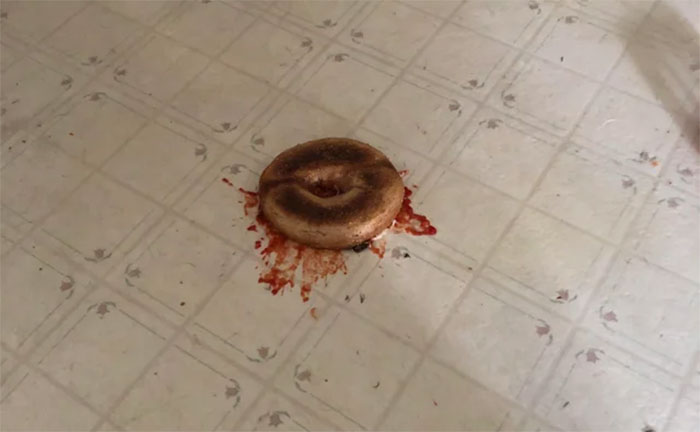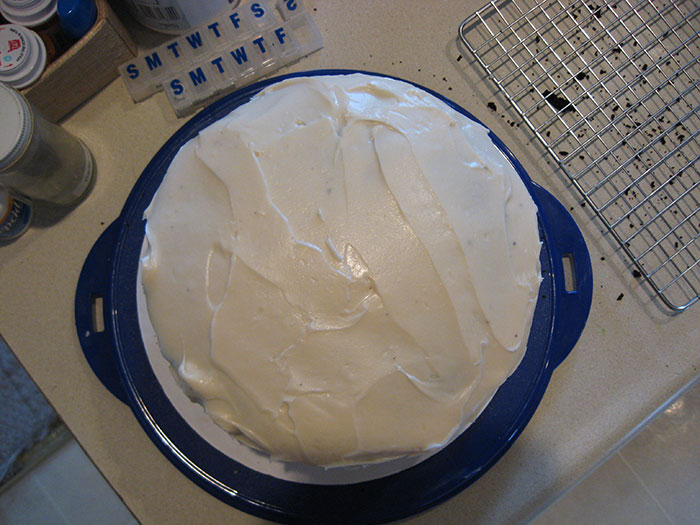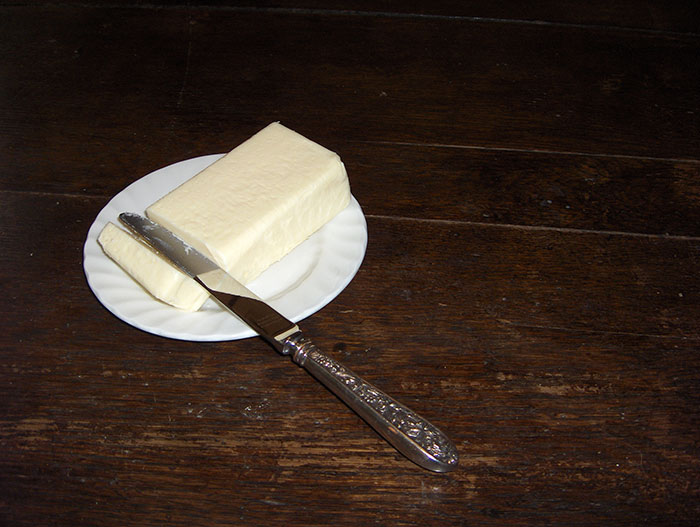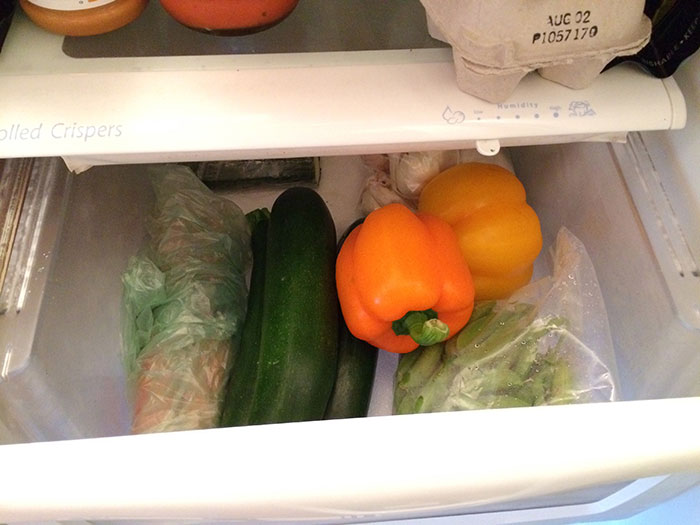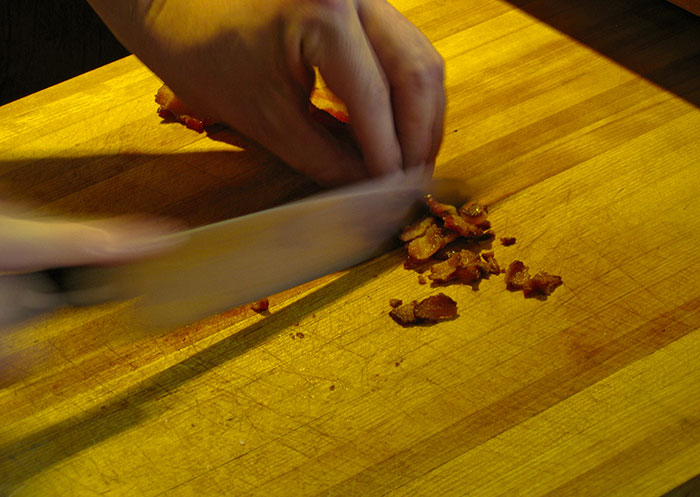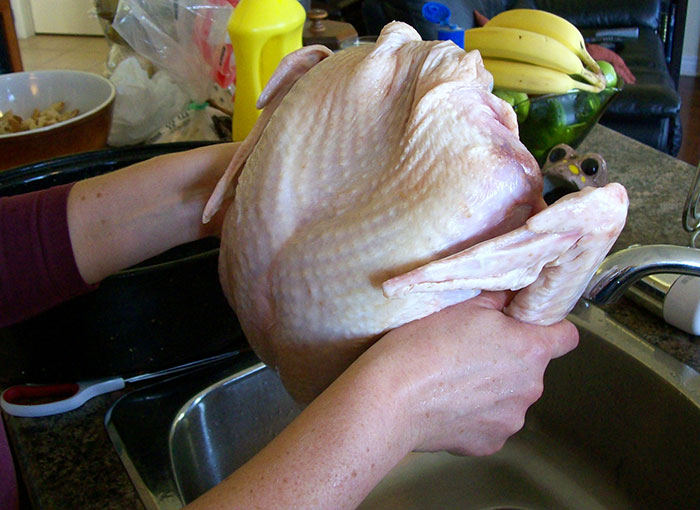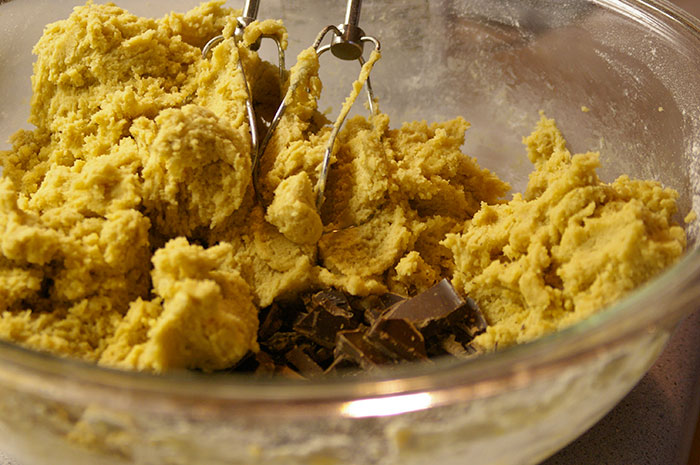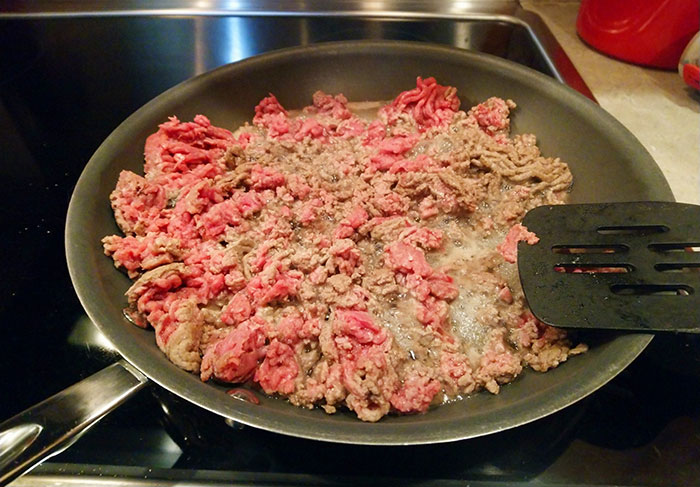It doesn't matter if you cook every day, or just every once in a while—food safety is something that can't be overlooked. Moreover, it's not something we usually talk about. Therefore, it comes as no surprise that many people still believe the myth of the 5-second rule. While some of the facts in this list may serve as a reminder, we hope you can learn something new, too. Scroll down below to see the short list Bored Panda made you and vote for the facts you liked the most, or didn't know yet! Also, in the comments down below, feel free to share your insights, tips, and tricks on food safety!
This post may include affiliate links.
Chocolate with white or grayish film is fine to eat
While white or grayish film formed on the surface of chocolate might not look very appetizing, turns, out it's perfectly fine to eat. The process occurs when cocoa butter fats separate from the cocoa.
Double-dipping can spread bacteria and viruses
Sadly, double-dipping is not the greatest idea, since it can spread bacteria and viruses, even when a person isn't visibly sick or unwell. Therefore, it's always best to put dip on your own plate and enjoy it without spreading germs to other people.
The 5-second rule is a myth
To test out people's favorite "rule," Dr. Ronald Carter from Queen Mary, University of London did an experiment. He dropped pizza, apple, and toast onto different surfaces and it revealed that they were all covered in germs. As it turned out, the "5-second rule" isn't true—bacteria can attach to food as soon as it touches the floor.
Refrigerated leftovers must be tossed out in 3 to 4 days
We all know that some types of bacteria can cause illness. However, as it appears, the types of bacteria that do don't affect the smell, taste, or appearance of food. This is why it's crucial to either freeze or throw out refrigerated leftovers within 3 to 4 days.
Or, you heat the leftovers to 165F just like you would raw food and then you're good.
Titanium dioxide that's found in icing has been linked to inflammatory bowel diseases
Titanium dioxide—an additive that's used to make white appear even whiter—can be found in a variety of foods, like coffee creamer, icing, powdered sugar, and ranch dressing. However, for the exact same reason, it is used in making sunscreens, laundry detergents, and paint. FDA considers the additive safe; however, there was research conducted that linked it to inflammatory bowel diseases. In addition to this, as of 2020, France has banned titanium dioxide in food.
Info: this is known as additive E171 in the EU if any Europeans here wish to check the label. It's banned in France as of januari first 2020 (as the only country in the EU to do so as of yet)!
The best way to know if the milk is still good is to smell it
Apparently, in the United States, every state has different laws on milk dates. Therefore, it's really up to people to judge the quality of it. Experts say that if you keep your fridge closer to 34℉, instead of the standard 40℉, you can get an extra week out of your milk. Of course, the longer its container was kept sealed, the better. All in all, it's always best to trust your good ole nose and just smell the stuff.
Ok so once I drank bad milk just regular white milk and it tasted lime strawberry milk blah 🤮 it was pretty gross so now all the milk smells the same to me.
A funky taste in water doesn't mean you can't drink it
Ever left a glass of water sitting on the bedside overnight and then it had that funky taste in the morning? Well, turns out it's perfectly fine to drink. Duh—after all, there are no ingredients in the water that would make it go bad.
It's recommended to keep butter in the fridge
We all know just how annoying it is trying to spread butter on bread that's still cold and hard. However, experts say that leaving your butter in warmer temperatures may accelerate the growth rates of spoilage microbes. So, it's always best to keep your butter in the fridge to prevent any unusual or unpleasant flavors.
I never do, and we get easily upwards of 35°C during summer. Think I've had to throw out butter twice in my life. Though, I also have worked in kitchens a lot, and there it is not uncommon to cube butter and keep a handful out for use. Might keep it in a cold bay, or might just take it out during prep/service and put it away after service. The advice you are getting here is not general advice. It might be good for immunocompromised people, but it is excessive for the average person. Germs on surfaces? No s**t. It's in the air. Better not breathe!
Load More Replies...I've never met anyone who keeps their butter outside of the fridge. I suspect the ingredients of New Zealand butter might be different to butter made in other countries. I just got off my butt and checked. It says on it to keep it refrigerated at or below 4'C.
It says on a bottle of soya sauce, which is probably mostly sodium, to keep it at or below 4°C. You know what you see in Thailand? Every other house is an ad-hoc diner, and they all frequently have soy sauce and other condiments left out, in the Thai climate, with a fly net covering it, and it stays there. Always. It says on most things that aren't dry or frozen to keep at or below 4°C. It's just a general rule of thumb. And I expect it has more to do with legal liability and protecting the industry more than protecting individuals. But it certainly doesn't follow that the rule of thumb is necessary or even particularly helpful.
Load More Replies...That's why folk used to have butter dishes. Each morning, you cut off off a small amount of butter, pit it in the butter dish, so that it is soft an easy to use, while the rest of the butter stays safe in the fridge.
Ooooh just posted above, our butter stays out. I grew up that way. Kids have grown up with butter out.
I'm 59.... never had butter go bad. But then it doesn't sit around for 3 weeks.
Wrong. Been on my counter for years and never had a problem.
If it's been there for years it's probably time to throw it out...
Load More Replies...I keep my butter in a cupboard and have for 50 years without a single problem.
After reading all these I realize I must have a strong immune system!
We've never kept our butter in the fridge. Since I was a kid & I'm 54. Never got sick from it & neither has any of my family members.
Yes I do...as I hate rancid butter (when it sits on the counter too long). But I do put a small amount (about a quarter of a pound) into a container. The rest I freeze. Then I put it out some time before I wish to use it so it is somewhat spreadable.
False. Neither the FDA nor the USDA take a firm stance on this. It takes several weeks for salted butter to "spoil" at room temperature, which then turns into cheese.
Even if the room-temp butter doesn't get spoiled before you use it, it can go rancid, which isn't good for your health, either.
Bruh it takes so damn long for butter to go rancid.
Load More Replies...Didn't every one already know this? Like we have "easy spread" butters for this exact reason
Who leaves butter out unless your just need it soft for later in the day?
I keep my butter in a covered butter container out on the counter. But we also go through a lot of butter
What person doesn't know that butter spoils - after weeks? Still gonna leave it out if I wanna use it for anything other than cooking. And even for cooking I'd wanna cube it rather than try to hack through a block of hardened fat every time I need some. And then I might as well just leave a little out anyway.
Meh, I'll take my chances. I don't want my white blood cells getting all soft and pasty...
Keep it in the fridge to PREVENT flavors? The fridge that’s full of other food?? The fridge that a different person said is full of bacteria that will harm your three-day-old food? No. Butter is fine on the counter as long as you don’t have pests. If the butter is going bad, put less of it out.
Hm... don't you have a butter dish? Prevents 100% of parasitic smells and flavours in your butter
Load More Replies...Produce bins in fridges are full of germs
A NSF International study found that the fridge produce compartment is one of the most "germiest" areas in people's kitchens. Therefore, it's essential to regularly clean out produce bins with hot water and liquid soap to prevent the buildup of bacteria.
Chopping boards are up to 200 times dirtier than a toilet seat
It has been found that chopping boards are up to 200 times dirtier than a toilet seat! And as it turns out, washing it after every use does not protect you from all the bacteria. It is recommended to have several chopping boards so you can use them for different types of food. In addition to this, you should change your chopping boards regularly as bacteria can hide in its scratches and crevices and thus contaminate other foods.
However wood chopping boards desiccate and kill bacteria when they dry out. Feel free to read this article from the Journal of Food Protection: https://pubmed.ncbi.nlm.nih.gov/31113021/
It's not recommended to rinse meat
While some people rinse meat and poultry before cooking, it turns out that while it can remove some of the bacteria from the surface, it doesn't do anything to those that are tightly attached. In addition to this, water can splash while rinsing meat onto worktops, cutlery, etc., and thus contaminate them.
It's best not to eat raw cookie dough
Flour doesn't have a bad rep for being a particularly "risky" food, but there's actually a chance to get sick from flour. Since it is made from wheat, it has the potential to contain deadly bacteria called E. coli. While food-borne illnesses don't happen often because of flour, as it's usually used in foods that are cooked and bacteria dies in heat, it is best not to indulge in raw cookie dough due to the dangerous bacteria.
Ground meats should reach 160°F for at least one second before consuming
USDA recommends that ground meats (including beef, lamb, pork, and veal) should reach 160°F for at least one second before consuming and do not require rest time. Poultry products, however, including chicken and turkey, should reach at least 165ºF for it to be safe to consume. Safe cooking temperature for whole cuts of pork is from 160 ºF to 145 ºF with the addition of a three-minute rest time. Whole cuts of other types of meat should cook at 145 ºF with the same three-minute rest time.
What about "tartare"? This post basically concern just north americans who have very low food safety standards.
Perishable food can be left at room temperature for no more than 2 hours
If you leave perishable food at room temperature for over 2 hours, it may become unsafe to eat by then. However, the "2-hour rule" becomes the "1-hour rule" when the temperature outside reaches 90 degrees or more. Bacteria grows very quickly at hot temperatures.
This is a generalization. Foods vary significantly in their likelihood to develop bacterial growth according to factors such as acidity, protein/carbohydrate ratio, surface area, etc.
Egg dishes should be cooked until they reach 160°F or more
When it comes to eggs, it's usually hard to tell whether its fine just by looking at its outer shell. However, they have a high chance of being contaminated with bacteria, like salmonella. So, the best practice is to refrigerate the eggs properly and cook them until both the yolk and white are firm. Any egg dishes should be cooked until their internal temperature reaches 160°F or more.
This would be better with Celcius added, you know, the measurement 90% of the world uses?
Lol I never understood why America is so stubborn about not switching to the freakin metric system. I mean, they're basically the only ones who don't use it...
Load More Replies...Wow this list is pretty irresponsible. Lots of half-truths, no sources, a couple of obvious things that anyone over the age of 2 knows.
Because there are really stupid humanoids on this planet
Load More Replies...Most of this sounds like it was written by the guy you never want to be stuck talking to at a party.
That would be the drunk angry guy who disparages people just to be a jerk. The cookie dough post was a bummer. I don’t trust your take on food comments though. Pineapple on a thin crust pizza with jalapeños and ham are must tries. EDIT: Apparently, in addition to liking trivia nerds, I must be a masochist for inviting potential hate. Sorry Ben if you get an inbox of comments.
Load More Replies...One that I've had to explain to people: mayonnaise does not contain dairy. While trying to look out for dairy allergies (for my spouse) I run across a *lot * of underinformed people. It contains eggs (and no matter where you try, you can't get eggs from a cow).
Yes, and RAW eggs, this post was wrong in so many levels.
Load More Replies...thank you for some good facts im going to gladly use them someday
Okay I won't and don't double dip. The rest I'm gonna ignore just like all the other healthy and still living people I know.
I consider myself to be a pretty poor cook, but even I knew all but 2 of these. If this article is new information for people, I despair.
This would be better with Celcius added, you know, the measurement 90% of the world uses?
Lol I never understood why America is so stubborn about not switching to the freakin metric system. I mean, they're basically the only ones who don't use it...
Load More Replies...Wow this list is pretty irresponsible. Lots of half-truths, no sources, a couple of obvious things that anyone over the age of 2 knows.
Because there are really stupid humanoids on this planet
Load More Replies...Most of this sounds like it was written by the guy you never want to be stuck talking to at a party.
That would be the drunk angry guy who disparages people just to be a jerk. The cookie dough post was a bummer. I don’t trust your take on food comments though. Pineapple on a thin crust pizza with jalapeños and ham are must tries. EDIT: Apparently, in addition to liking trivia nerds, I must be a masochist for inviting potential hate. Sorry Ben if you get an inbox of comments.
Load More Replies...One that I've had to explain to people: mayonnaise does not contain dairy. While trying to look out for dairy allergies (for my spouse) I run across a *lot * of underinformed people. It contains eggs (and no matter where you try, you can't get eggs from a cow).
Yes, and RAW eggs, this post was wrong in so many levels.
Load More Replies...thank you for some good facts im going to gladly use them someday
Okay I won't and don't double dip. The rest I'm gonna ignore just like all the other healthy and still living people I know.
I consider myself to be a pretty poor cook, but even I knew all but 2 of these. If this article is new information for people, I despair.




